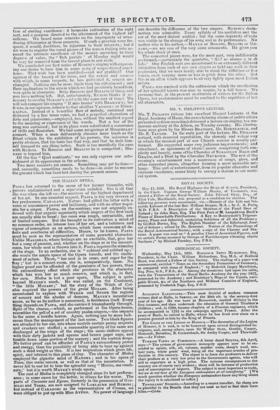THE ITALIAN OPERA.
PASTA has returned to the scene of her former triumphs, with t powers undiminished and a reputation unfaded. She is all that she was when she left us—the mistress of the highest department of her art. In one essential respect, PASTA is the very reverse of her predecessor, CATALANI. Nature had gifted the latter with a voice of uncommon power and brilliancy, and with no other requi- site for a singer. PASTA, on the contrary, was not originally en- dowed with that organic superiority which singers of the first rank are usually able to boast ; her voice was rough, untractable, and of limited compass. But she brought to its cultivation a mind of no common order, an intense love of her art, and a boldness and vigour of conception as an actress, which have overcome all de- fects and overborne all difficulties. Hence, to be known, PASTA must be seen as the representative of some powerful character. Unlike MALIBRAN, whose feelings are so excitable, that, give her but a song of passion, and, whether on the stage or in the concert- room, her whole soul is thrown into it, PASTA requires the stimulus of the stage. In an orchestra, she is " cabined and cribbed up ;" she wants the ample space of the Opera boards, and the excite- ment of action. There," her soul is in arms, and eager for the fray ;" but in a concert-room, she is, comparatively, tame. No higher proof can be afforded of the greatness of her powers, than the extraordinary effect which she produces in the character which has won her so much renown, and which is, in fact, her own. Medea is but a poor opera. The subject is quite beyond MA.YER'S reach. He was called, on the Continent, "the little MOZART ;" but the story of the Witch of Col- chis required the powers of the great MOZART. After being accustomed to explore with WEBER and SPOHR the regions of sorcery and the abodes of demons, MAYER'S incantation scene, as far as its author is concerned, is feebleness itself. Every thing depends on PASTA, and she carries it triumphantly through. Spite of the chorus,—which, as performed at the Opera-house, resembles the yell of a set of country psalm-singers,---she imparts to the scene a terrific horror. Again, nothing can be more ludi- crous than the management of the last scene. Two black figures are attached to her car, into whose nostrils certain penny serpents and crackers are stuffed ; a reasonable quantity of the same are discharged at the wings of the stage ; the scene-shifters appear with their dirty jackets and aprons and brown paper caps, and tumble down some portion of the scenery ; and the curtain drops. No better proof can be afforded of PASTA'S extraordinary power and energy, than the possibility of being able to bear tip against
i
such a dead weight as this. It s her inspiration which gives life, spirit, and interest to this piece of clay. The character of Medea employed the gigantic mind of HANDEL ; and in his opera of Teseo, this scene occurs, as well as that of the incantation. It never fell to our lot to hear the splendid song " Moriro, ma vendi- cata;" but it is worth MAYER'S whole opera. The cast of Medea is completely changed since its last perform- ance; in some cases for the better, in others for the worse. The parts of Creontes and .Egeas, formerly in the possession of GIU- BILEI and TORRI, are now assigned to LABLACHE and Ruatm ; but instead of CARADORI as the representative of Creusa, we Were obliged to put up with Miss AYTON. No power of language can describe,the difference of the two singers. RUBINI'S decla- mation was admirable. Every syllable of his recitative met the ear of the most distant auditor ; but tile same depravity of taste. was visible, in the change of his song and in its performance. No matter who is his author,—MAYER or ROSSINI, BELLINI or Mo- ZART,—we are sure of the very same ornaments. He gives you his whole stock at once.
The concerted pieces were, for the most part, very indifferently performed,—particularly the quintetto, ! se manco • a le di 1-de." Our English ears are accustomed to so extremely different intonation from such of our own singers as hold any rank in their profession, that we were hardly able to stand the infliction of fivo. voices, each varying more or less in pitch front the other. But this is an affair which appears to sit very lightly upon most Italian artists.
PASTA was received with the enthusiasm which the recollection of her splendid talents was sure to inspire, by a full house. We presume that, in the present destitution of writers for the Italian Opera, her performances must be confined to the repetition of her old characters.



























 Previous page
Previous page